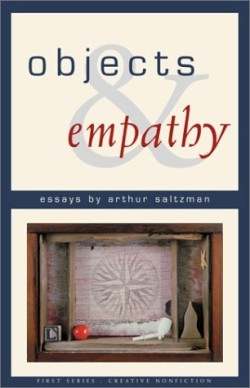Objects and Empathy
As a genre, creative nonfiction is not only teasingly resistant to easy definition, but provocatively open-ended in its scope and sweep. With twenty-five short essays, Saltzman displays a deft touch at eliciting the revelations that can reside in the space where fact and fiction intertwine.
Weaving together fiction, personal memoir, and literary criticism, he depicts the evocative associations triggered by both the mundane and epic objects of personal experience: childhood games, empty rooms, illness, and death take turns as capacious sites to explore the limitations of awareness and the contingency of life. Alternately wise and wry, elegiac and enlivening, Saltzman’s lyric fragments aim to satisfy Don DeLillo’s writerly challenge—“to ride his own sentences into new perceptions.”
While “objects and empathy” form a loose theme for this eclectic collection, each essay offers a fresh elaboration on the different ways that this roomy topic can be explored. With “Incipience and Other Alibis,” a description of the simple act of awaking is transformed, through fictional ruminations and references from T.S. Eliot, Emily Dickinson, and All in the Family, into a commentary on fate and the elusiveness of reassurance. In gentle parody, “From the Letters to Gamma Man” satirizes fan mail, converting it into a humorous exploration of heroism and the allure it holds.
Perhaps most movingly, “Body Language” threads together personal memoir and aphoristic narrative to recount the death of a father. In poignant, spare, and unblinking prose, Saltzman captures the hard despair of a young man seeking consolation. “The body is a record of the past,” he writes. “It is a savage culmination that remembers everything. His father’s body had become a slum, his prospects a neighborhood gone bad. In the end, his only option was to sell short.”
Saltzman’s biographical details give the work a vividly personal touch, and he also draws from a private archive of literary and poetic references to inflect those emotional meditations with grace and depth. Beloved phrases from Edward Albee, John Updike, James Baldwin, and Gertrude Stein percolate throughout, emerging most effectively as tonal amplification to some of Saltzman’s most private memories—his father’s anger, breakfast with a boyhood friend, a daughter’s perplexing disability.
In the intimate turns of his associative logic, Saltzman, professor of English at Missouri Southern State College, richly warms the fine-tuned rigor of a senior scholar—and affirms the endeavor he proposes in his preface. “[W]orking on these pieces began for me as escapes from, experimental therapies for, or antidotes to the literary critical writing that generally occupies me,” he explains. “They offer another way to wonder, to sympathize, to puzzle in, to puzzle out, and to praise.”
Reviewed by
Vicki Hsueh
Disclosure: This article is not an endorsement, but a review. The publisher of this book provided free copies of the book to have their book reviewed by a professional reviewer. No fee was paid by the publisher for this review. Foreword Reviews only recommends books that we love. Foreword Magazine, Inc. is disclosing this in accordance with the Federal Trade Commission’s 16 CFR, Part 255.

